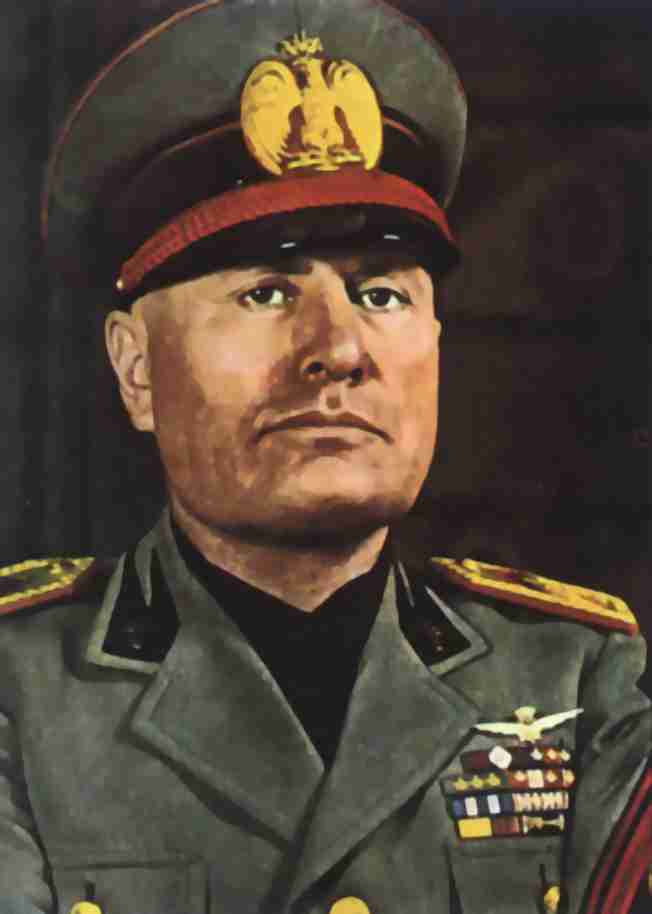Meaning of Fascism
The term '“Fascism" is
derived from the Latin word 'Fasces' means a bundle or group.
Mussolini of Italy, who is associated with Fascism, organized in the beginning
groups of young persons or gangs called the ‘fasces', to
create terror among the people who were considered enemies of the nation.
Fascism rests on four pillars of
charismatic leadership, single party rule under a dictator, terror and economic
control.
Mussolini believed in the efficacy of these
slogans and their accompanying action : “Believe, Obey, Fight”
and
"The
More Force, The More Honour*.
Reasons for the emergence of Fascism
The prevailing economic, social and
political conditions were very favourable to the rise of fascism in Italy.
Economic crisis
Italy faced with a great economic crisis
on account of the huge expenditure incurred on the war. The national debt
increased manifold. There was social unrest and economic distress in the
country, the prices of essential goods shot up. Cost of living rose very high.
Socialism gathered new strength.
There was great dismay and frustration
after the Treaty of Paris. Although a victor and constitute of the Allies, Italy
did not gain substantially from the spoils of war.
Disruptive activities of the socialists
On account of the revolutionary ideas of
the socialist, unrest had spread in the country.
Need for a charismatic leader
The situation demanded a bold leadership and
the same was supplied by the fascist leader Mussolini.
 |
| Benito Amilcare Andrea Mussolini |
Benito Amilcare Andrea Mussolini was bom
on July 29,1883 at Romagna in East-Central Italy. His father was a blacksmith
and mother was a elementary school teacher.
Mussolini
graduated in 1902 and became a school teacher. He gave up that post and came to
Switzerland. He came into contact with Lenin and learned his ideology. He
became an editor of Italian socialist paper in Austria. He was expelled from
Austria and returned to Italy. He edited a socialist paper called Avanti,
the official voice of Italian Socialism.
During the first World War, he gave up his policy and joined the military.
After the war he gathered round him a band of young enthusiasts who came to be
known as Fascists. With the help of the fascists, he organised the National
Fascist Party in November 1921.
Seizure of Power by the Fascists
On October 30,1922, the Fascists organized
a march to Rome and showed their strength. The government surrendered. The emperor
Victor Emanuel III, invited Mussolini to form the Government. Thus the Fascist
revolution became a spectacular success as the Fascists seized power without
blood shed. But the after math of revolution was marked by suppression, murder
and exile. Fascist dictatorship under Mussolini came into existence. He
remained power from 1922 to 1945.
Fascist Patty
The followers of Mussolini were called
Black Shirts. He was called by his followers as ''Quce" His
secret police was known as OVRA (Voluntary Ogranlsation for the
Repression of anti-Facists).
Alms of Fascism
'Exaltation of the State Protection of
Private property and Spirited Foreign Policy’
Motto of Fascism
'Everything within the state Nothing
against the state Nothing outside the state’
Achievements of Italy under Mussolini:
Mussolini was a great leader. He wanted to
make Italy a powerful nation. So, he adopted various methods. Mussolini
established peace and order and he provided a stable government.
Mussolini brought order and discipline in
the industrial field. The “Charter of Labour" issued
by him provided great relief to workers. Industries were freed from the strike
epidemic. Mussolini took several measures to increase production. Marshes were
drained. Canals were dug. Reclamation projects were launched. Hydroelectric
schemes were undertaken. Railways and other means of transportation were
improved. A fair degree of self sufficiency was achieved.
As a realistic administrator, Mussolini
patched up with the Pope. A conflict that had been going on for nearly 60 years
between Papacy and the Italian government came to an end by the Latern Treaty
of 1929, signed between the Pope and Mussolini. By this treaty Mussolini
recognized the papacy of the pope in the Vatican city and in turn the Pope
recognised the sovereignty of the king in Rome. The reconciliation with the
Pope was a great victory and it increased the powerand prestige of Mussolini.
Aggressive foreign policy that ends in disaster:
Mussolini
began to follow the vigorous and forward foreign policy. He was determined to
raise the prestige of Italy in the eyes of the other powers of the World.
Mussolini's
slogan before the nation was 'Italy must expand or perish".
In 1936, he annexed Ethiopia.
He
left the League of Nations in 1937. He captured Albania in 1939.
Mussolini
made common cause with Hitler, another war monger. He joined the Rome-Berlin-Tokyo
axis. The Second World War (1939-45) brought
disaster to Italy.
In
1941, Italy lost its territories in Africa. Mussolini failed to cope up with
the financial burden of the war.
The Allied forces heavily bombarded Sicily
and landed in the island in 1943. Mussolini was shot dead by his own country
men in 1945. After his fall, Italy became a Republic,
Fascism died out along with the death of its founder, Mussolini.
Also Read:
Also Read:
- Roman Empire and its Fall - Medieval Europe
- Mesopotamian Civilization
- Zoroastrianism - Intellectual Awakening in 6th Century B.C.
- Greek and Roman Civilization Greek Civilization
- Feudalism in Medieval Europe
- The rise of the papacy in Medieval Europe and its Consequences
- Imperialism in China and its END!
- Imperialism - Meaning, Types, Techniques and Causes - With lmperialism in India
- Crusades (1095 -1444) - Holy wars of Medieval World History
- Great Depression of 1929 - Causes, impact and measures taken. Impact on India
- French Revolution - World History
Advertisements
No comments:
Post a Comment